
The Book of Jonah 2 contains one of Scripture’s most profound prayers, delivered from the belly of a great fish by a prophet who stood at death’s door. This chapter reveals ten powerful lines of prayer that Jonah spoke after drowning in the Mediterranean Sea, a prayer that foreshadows the death and resurrection of Jesus Christ three days later.
Table of Contents
Understanding the Historical Reality of Jonah’s Experience
What actually happened to Jonah in chapter 2? The Book of Jonah 2 records Jonah’s death by drowning after being thrown overboard during a violent storm. He descended to the ocean floor where a large fish swallowed his body. For three days, Jonah remained dead inside this creature while his soul prayed from the gates of Sheol, the realm of the dead. This was not a symbolic story but a historical event that foreshadowed Christ’s resurrection.
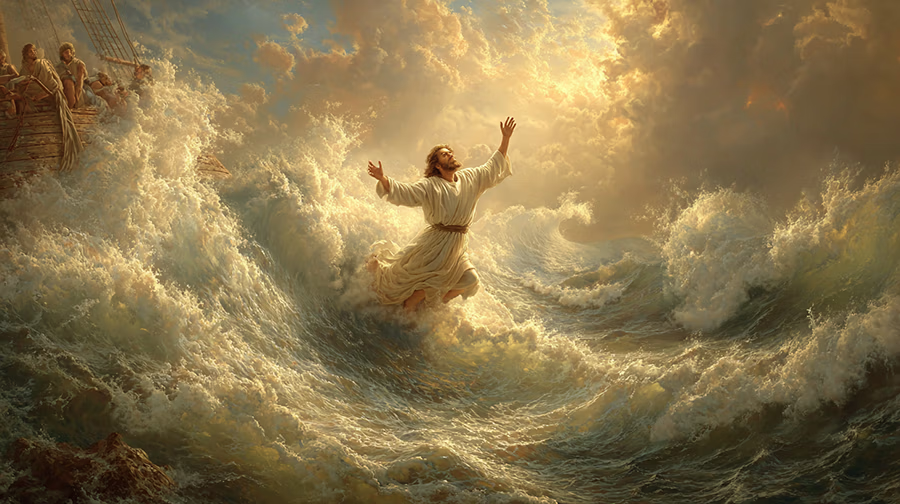
One of the greatest challenges modern readers face when studying the Book of Jonah 2 is accepting its historical authenticity. This account is not a children’s story with a friendly cartoon whale. Jonah was a real prophet who lived in a verifiable town, departed from an identifiable port, and experienced a genuine supernatural intervention that would later become one of the most important prophetic signs in all of Scripture.
The ancient Hebrews had a specific word for whale: leviathan. The text deliberately uses a different term, describing a “great fish” without naming the species. This was likely a bottom-feeding creature of enormous size, possibly similar to what we might identify as a whale shark today, though we cannot know with certainty. What matters is understanding that this was a real biological creature that God sovereignly directed to accomplish His purposes.
Jonah was not simply a minor prophet making a mistake. He was a well-known figure in Israel who had previously delivered accurate prophecies that came true. His relationship with God was established and genuine. Yet when God called him to preach to Nineveh, the capital of Assyria, Jonah’s response was complete defiance. This wasn’t ignorance or confusion but willful rebellion rooted in racial hatred and theological certainty that God would extend mercy to Israel’s enemies if given the opportunity.
The archaeological and historical evidence supporting the Book of Jonah 2 and the surrounding narrative is substantial. We can identify the locations mentioned in the text. We have historical records of Nineveh and the Assyrian Empire. The rapid conversion of an entire city, as improbable as it seems, is corroborated by historical accounts of Jonah’s lasting impact on Assyrian culture. This prophet became such a significant figure among the Assyrians that he could never return to Israel, where the religious leaders viewed his ministry to the Gentiles as a betrayal.
The Theological Significance of Jonah’s Death
When Jonah hit the water during that violent Mediterranean storm, he was not engaging in a swimming exercise. Tempest conditions create what might be described as a massive washing machine effect, with waves breaking from multiple directions simultaneously. Even the strongest swimmer becomes completely powerless in such circumstances. The text makes clear that Jonah drowned on his descent to the ocean floor.
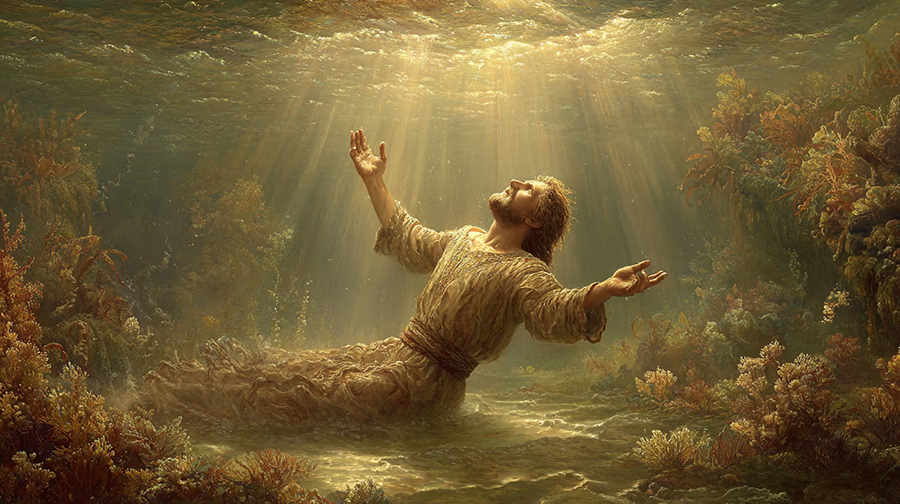
This death was not accidental or merely unfortunate. It was divinely orchestrated to accomplish multiple theological purposes. First, God was breaking through Jonah’s hardened heart, which had resisted every other form of divine persuasion. Second, Jonah’s experience was creating a prophetic sign that would point forward to the Messiah. Third, through Jonah, God was sending a message to the entire nation of Israel about their own rebellious condition and need for repentance.
The Book of Jonah 2 describes Jonah’s soul at the gates of Sheol, the Hebrew term for the realm of the dead. This was not a metaphorical experience or near-death encounter but actual death. Jonah’s body had ceased functioning, yet his soul remained conscious at the threshold between this world and eternal separation from God. If he passed through those gates, he would be eternally lost, never again seeing the temple or experiencing God’s presence.
This extreme measure reveals something crucial about both God’s character and the seriousness of Jonah’s rebellion. God loved Jonah enough to take him to the very edge of eternal death rather than allow him to continue in disobedience. God also loved the people of Nineveh enough to go to extreme lengths to ensure His message of repentance reached them. The intersection of these two divine purposes created one of Scripture’s most dramatic moments.
Jonah’s Prayer: Ten Lines from the Gates of Hell
What does Jonah’s prayer in chapter 2 teach us? The ten-line prayer in the Book of Jonah 2 teaches that God hears prayers from any circumstance, even from the gates of death. Jonah’s prayer demonstrates genuine repentance, acknowledges God’s sovereignty over his suffering, expresses faith in God’s deliverance, warns against idolatry, and commits to fulfilled vows, showing that God’s mercy extends to those who cry out to Him even at the last moment.

The structure of Jonah’s prayer in the Book of Jonah 2 follows a progression that takes readers from the depths of despair to the heights of faith. These ten lines were written by Jonah years after the event, reflecting both on what his soul experienced in death and what he learned through God’s miraculous intervention. The prayer format makes it accessible for memorization and liturgical use, which was common for important prayers in ancient Hebrew culture.
Line 1: “Then Jonah prayed to the Lord his God from the fish’s belly”
This opening establishes the impossible circumstances of the prayer. Jonah is inside a great fish, his body dead for three days, yet his soul maintains enough consciousness to call out to God. The text emphasizes “his God,” reminding readers that despite Jonah’s rebellion, the relationship between the prophet and the Lord remained intact. God had not abandoned Jonah even when Jonah tried to abandon God’s call.
The phrase “from the fish’s belly” immediately establishes the miraculous nature of what follows. This is not a prayer from a comfortable temple or a peaceful hillside. This is a prayer from inside a creature at the bottom of the sea, delivered by someone who by all natural standards should no longer exist. The very possibility of this prayer demonstrates God’s supernatural preservation of Jonah’s soul for a specific purpose.
Line 2: “I cried out to the Lord because of my affliction, and He answered me”
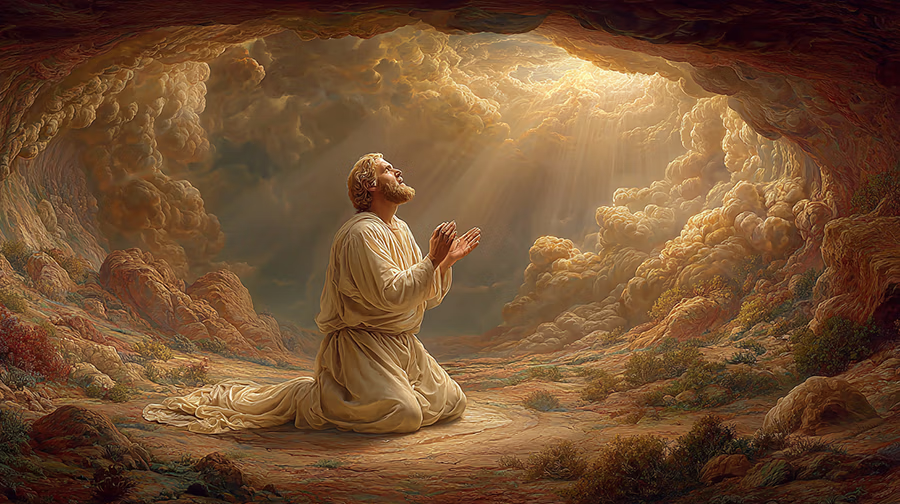
Notice the past tense: “He answered me.” Jonah, writing years later, knows the end of the story. But the Jonah inside the fish at that moment had no such assurance. This demonstrates the nature of faith, which sometimes must cry out without certainty of the response. Yet God’s character is such that He does respond to those who genuinely call upon Him, even when they have been running in the opposite direction.
The word “affliction” here is significant. Jonah could have used many terms to describe his situation: punishment, judgment, consequence, disaster. Instead, he chooses “affliction,” which acknowledges his suffering while implicitly recognizing that God’s purposes might extend beyond simple retribution. This word choice reveals the beginning of Jonah’s shift in perspective from self-righteous rebel to humbled servant.
Line 3: “Out of the belly of Sheol I cried, and You heard my voice”
Here the Book of Jonah 2 becomes explicitly clear about Jonah’s condition. Sheol is not a metaphor or exaggeration. It is the Hebrew understanding of the realm of the dead, the place where souls go when separated from their bodies. Jonah is at the entrance to this realm, having passed through physical death but not yet through the final gates that would seal his eternal fate.
The phrase “You heard my voice” carries profound theological weight. Even at the gates of hell, God’s hearing extends to those who call upon Him. This contradicts the assumption that death creates an unbridgeable separation. While the Book of Jonah 2 does not provide a full theology of the afterlife, it does reveal that God’s sovereignty and mercy extend even into the realm of death itself, anticipating Christ’s later declaration that He holds the keys of death and hell.
Many of us, like Jonah, are hardened cases who require extreme circumstances before we genuinely cry out to God. Our culture has become a hardened case, resistant to correction and unwilling to acknowledge divine authority. Israel in Jonah’s time was a hardened case, going through religious motions while ignoring God’s heart for all nations. The Book of Jonah 2 serves as a warning that God sometimes allows us to reach the gates of hell before we finally recognize our desperate need for Him, as explored in our examination of divine lessons in obedience found in the Book of Jonah 1: Divine Lessons in Obedience and Running from God.
Lines 4-5: The Violence of God’s Judgment
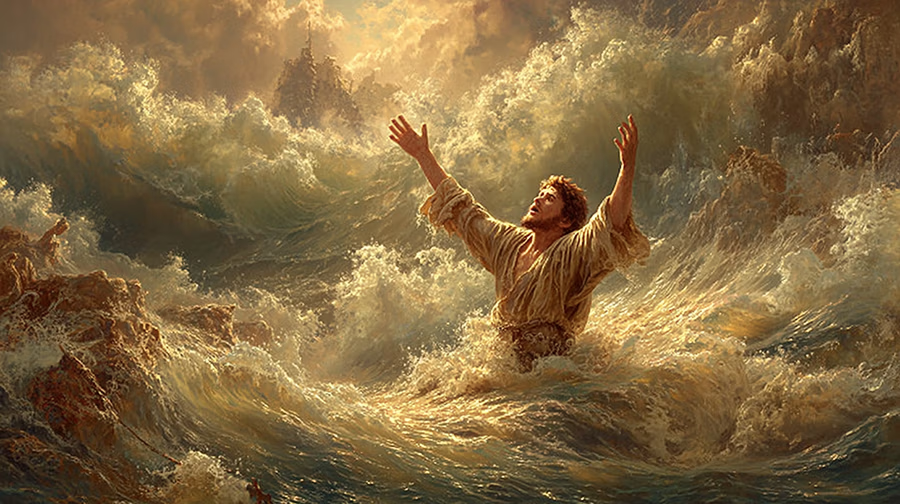
The Book of Jonah 2 continues with Jonah’s description of his drowning: “For You cast me into the deep, into the heart of the seas, and the floods surrounded me. All Your billows and Your waves passed over me.”
Notice that Jonah does not blame the sailors who physically threw him overboard. He recognizes God’s sovereign hand behind all the secondary causes. The storm, the lot that fell on him, the sailors’ reluctant decision, and the waves that pulled him down—all were instruments of divine purpose. This recognition demonstrates spiritual maturity that Jonah was developing through his ordeal.
The phrase “into the heart of the seas” emphasizes the totality of his submersion. He was not near the shore where rescue might be possible. He was in the deep waters where human help could not reach. The “billows” and “waves” that passed over him were not random natural phenomena but “Your billows” and “Your waves,” possessing a targeted, purposeful quality that Jonah experienced as inescapable.
This description helps modern readers understand the violence of Jonah’s death. Contemporary audiences often picture a gentle sinking or a peaceful underwater scene. The reality was a brutal drowning in storm-tossed waters, with waves breaking from every direction, pulling the prophet down regardless of any swimming ability he might have possessed. The physical trauma of this death would later be evident in Jonah’s appearance when he emerged from the fish.
Line 6: Faith in the Midst of Despair
“Then I said, ‘I have been cast out of Your sight; yet I will look again toward Your holy temple.'”
This line in the Book of Jonah 2 reveals the tension between human perception and divine reality. Jonah felt cast out from God’s sight, experiencing the emotional and spiritual anguish of separation from God’s presence. The temple, as the physical location of God’s special presence in Israel, represented everything Jonah feared he would never experience again.
Yet even in this despair, faith emerged: “Yet I will look again toward Your holy temple.” This “yet” is one of the most powerful words in Scripture, representing the human choice to believe God’s character even when circumstances suggest abandonment. Jonah had no objective reason to expect survival at this point. His body was dead, his soul was at hell’s gates, and humanly speaking, his situation was irreversible.
This faith did not come from Jonah’s strength or spiritual superiority. Remember, this was the same man who had spent considerable effort and resources trying to flee as far from God as possible. Rather, this faith emerged from God’s work in Jonah’s heart, breaking through layers of rebellion and prejudice to reach the prophet’s core identity as someone who had once known and walked with God, similar to the themes of faith and providence we see throughout Scripture, as demonstrated in the Book of Ruth Chapter 1: Faith and Providence.
Lines 7-8: The Final Moments of Physical Life
“The waters surrounded me, even to my soul; the deep closed around me; weeds were wrapped around my head.”
These lines provide vivid sensory details of Jonah’s drowning. The progression from waters surrounding “even to my soul” indicates the transition from physical to spiritual experience. As consciousness faded, Jonah became aware of the deep closing around him, the light growing dimmer as he sank deeper. His final physical sensation was seaweed wrapping around his head, a detail so specific that it confirms this was a genuine eyewitness account rather than fabricated story.
The descent to the ocean floor is described in Line 9: “I went down to the moorings of the mountains; the earth with its bars closed behind me forever.”
The “moorings of the mountains” refers to where underwater mountain ranges meet the seafloor, indicating Jonah had sunk to the deepest point. The “bars” closing behind him “forever” suggests the finality of death, the sense that this was an irreversible crossing. From every human perspective, Jonah was finished. There would be no recovery, no second chance, no miraculous intervention.
Yet the next phrase shatters this apparent finality: “Yet You have brought up my life from the pit, O Lord, my God!”
This is the older Jonah writing, inserting retrospective knowledge into the chronological account. The Jonah experiencing death in the fish believed he was finished. The Jonah writing the Book of Jonah 2 years later knows that God performed an impossible rescue. This literary technique allows readers to experience both the desperation of the moment and the triumph of God’s deliverance simultaneously.
Line 10: The Turning Point of Remembrance
“When my soul fainted within me, I remembered the Lord; and my prayer went up to You, into Your holy temple.”
The Book of Jonah 2 here describes the absolute last moment of consciousness before Jonah would have passed into eternal death. His soul was fainting, losing even that spiritual electricity that maintained awareness after physical death. In that final millisecond, Jonah remembered the Lord.
This remembrance was not merely intellectual recall but a complete reorientation of will and desire. Everything that had motivated Jonah to flee from God’s call—the racial prejudice, the theological certainty about who deserved God’s mercy, the personal comfort he prioritized over obedience—all of this burned away in the face of eternal death. What remained was the foundational reality of Jonah’s relationship with God and his desperate need for divine mercy.
The prayer that went up from this place of extremity reached God’s holy temple, the earthly location of His special presence. This detail emphasizes that God hears prayers regardless of the physical location or circumstances of the one praying. Whether from the temple courts or from the belly of Sheol, sincere prayers ascend to God’s throne, a principle that applies to believers today who may feel distant from God due to their circumstances or failures.
For contemporary believers, this moment in the Book of Jonah 2 raises an uncomfortable question: How close to eternal death will we allow ourselves to come before we genuinely cry out to God? Do we wait until the final millisecond, or do we respond to God’s earlier, gentler calls? The text does not criticize Jonah for waiting so long, but neither does it present his stubbornness as admirable. It simply reveals God’s patient willingness to pursue His servants to whatever lengths necessary to break through their resistance.
The Warning Against Idolatry in Modern Times
How does the Book of Jonah 2 address idolatry? In the Book of Jonah 2, Jonah warns that “those who regard worthless idols forsake their own mercy,” teaching that anything we prioritize above our relationship with God becomes an idol that prevents us from receiving His mercy and salvation. This applies to modern idols like career, appearance, wealth, entertainment, and even health pursuits when they supersede spiritual priorities.

After describing his deliverance from death, Jonah shifts to a prophetic warning that speaks beyond his immediate situation to address Israel, the pagan sailors he encountered, and by extension, readers throughout history: “Those who regard worthless idols forsake their own mercy.”
This statement might seem like an abrupt transition within the Book of Jonah 2, but it directly connects to Jonah’s experience. The prophet had made an idol of his own theological certainty and ethnic identity. He valued his conviction that God should not show mercy to Assyrians more than he valued obedience to God’s direct command. In doing so, he forsook God’s mercy toward himself, requiring divine intervention at the gates of hell to break through his idolatry.
Contemporary Idols That Forsake Mercy
The application to modern American culture is direct and uncomfortable. What are the worthless idols that contemporary Christians regard highly enough to forsake eternal mercy? These idols often appear innocent or even positive on the surface, making them more dangerous than obviously sinful choices.
Consider the idol of physical appearance and the multi-billion dollar industry built around it. When people prioritize maintaining a certain look or weight above securing their relationship with God, they engage in the same category of idolatry Jonah described. This might manifest as daily injections for weight loss while neglecting daily prayer, or spending hours on physical fitness while giving minutes to spiritual development. The activities themselves are not evil, but when they supersede eternal priorities, they become worthless idols that cost people their own mercy.
The idol of career success and professional achievement captures many believers. When advancement, recognition, or financial gain becomes the driving motivation of life while spiritual growth remains optional, the idol has displaced God. The Book of Jonah 2 reminds us that none of us knows which day will be our last. If we reach that final moment without having settled our eternal relationship with God through Jesus Christ, all our professional achievements become meaningless, and we have forsaken our own mercy in pursuit of temporary success.
Entertainment and distraction function as worthless idols for much of contemporary culture. Whether through social media scrolling, binge-watching shows, constant gaming, or other forms of digital consumption, many people spend more time with screens than with Scripture, more energy curating online personas than cultivating spiritual depth. When the prophet warns about forsaking mercy for worthless idols, these time-consuming distractions that prevent spiritual engagement qualify completely.
Even pursuits that are genuinely good can become idols when misplaced in our priority structure. As our Bible Messages series consistently emphasizes, God calls us to order our lives with Him at the center, not merely as another interest among many. A person might love mountain biking, classic cars, or culinary arts, and these hobbies can glorify God when kept in proper perspective. But if someone would rather spend their weekend on the trails or in the garage than address the fundamental question of their eternal salvation, that hobby has become a worthless idol.
The Proper Response: Sacrifice with Thanksgiving
Jonah’s response models the appropriate alternative to idolatry: “But I will sacrifice to You with the voice of thanksgiving; I will pay what I have vowed.”
This commitment has several components. First, Jonah promises public worship at the temple, where sacrifices were offered according to God’s prescribed system. Second, he commits to vocal testimony, speaking his thanksgiving aloud so others would hear of God’s deliverance. Third, he pledges to fulfill his vows, which likely included both specific promises made during his crisis and his original calling to preach to Nineveh.
The phrase “voice of thanksgiving” emphasizes public declaration rather than private gratitude. The Book of Jonah 2 was written so that Jonah’s testimony would continue speaking to generations who never met him. His willingness to document his rebellion, death, and deliverance serves as an ongoing sacrifice of thanksgiving that continues to impact readers thousands of years later.
For contemporary believers, this pattern of sacrifice with thanksgiving should characterize our response to God’s mercy. This doesn’t mean animal sacrifices, which Christ’s death fulfilled and ended, but it does mean public acknowledgment of God’s work in our lives. It means vocal testimony that attributes our deliverance to God rather than circumstances, personal strength, or good fortune. It means fulfilling commitments made to God rather than forgetting them once the crisis passes.
The warning about worthless idols directly connects to our mission at Trust and Obey with Chuck Frank, which recognizes that a constitutional republic can only survive and thrive with a believing populace. When a nation makes idols of prosperity, military strength, political power, or cultural influence while forsaking the God who provides mercy, that nation walks the same path Jonah walked toward divine judgment. The Book of Jonah 2 serves as a historical warning about where such idolatry inevitably leads.
The Conclusion of Jonah’s Prayer: Salvation Belongs to the Lord
What is the main message of Jonah’s prayer in chapter 2? The main message of the Book of Jonah 2 prayer is summarized in its conclusion: “Salvation is of the Lord.” This means that deliverance from both physical and spiritual death comes solely from God’s power and mercy, not from human effort, worthiness, or ability, and that God can save from any circumstance, no matter how impossible it appears.
The ten-line prayer in the Book of Jonah 2 concludes with a theological declaration that summarizes everything Jonah experienced: “Salvation is of the Lord.”
These five words contain the entire gospel in seed form. They establish several crucial truths that undergird all biblical teaching about redemption. First, salvation belongs to God, not to human beings. We cannot save ourselves through moral effort, religious activity, philosophical enlightenment, or personal transformation. All such efforts amount to worthless idols that forsake God’s mercy.
Second, because salvation belongs to the Lord, He has the authority to grant it to whomever He chooses. This was the truth Jonah had been running from. He knew that if he delivered God’s message to Nineveh, God would likely extend mercy to them if they repented. Jonah’s prejudice told him the Assyrians did not deserve such mercy. But the Book of Jonah 2 demonstrates that Jonah himself did not deserve mercy either. No one does. Mercy by definition goes to the undeserving. Salvation belongs to the Lord means He may save whom He will, when He will, and how He will, as we explore more deeply when examining God’s providential work in seemingly hopeless situations throughout our study of the Books of the Bible.
Third, if salvation belongs to the Lord, then it is always available to those who cry out for it. No circumstance places someone beyond the reach of God’s saving power. Jonah proved this by being saved from death itself. Later, Nineveh would prove it when an entire city turned from wickedness in response to a one-sentence sermon from a prophet who looked like he had been digested by a fish.
The Miraculous Deliverance
Line 10 of the prayer concludes the theological reflection and transitions to the physical miracle: “So the Lord spoke to the fish, and it vomited Jonah onto dry land.”
The simplicity of this statement belies the extraordinary nature of what occurred. God spoke to a fish. The creature obeyed. It swam from wherever depth it had been feeding to the shoreline. During that journey, Jonah’s body, which had been dead for three days, was revived and returned to life. The fish then expelled him onto dry land before returning to the sea.
The text gives no physical explanation for how dead cells regenerated, how decomposition reversed, how a fish understood divine communication, or how Jonah survived three days without oxygen. These are miracles, by definition beyond natural explanation. They demonstrate God’s absolute sovereignty over creation and His power to reverse even death itself.
The Book of Jonah 2 deliberately parallels the resurrection of Jesus Christ, who was dead for three days before God raised Him. Jesus Himself made this connection explicit when He told the Pharisees that no sign would be given to them except the sign of Jonah. Just as Jonah was three days and nights in the fish’s belly, so the Son of Man would be three days and nights in the heart of the earth. Then, as Jonah was delivered alive from the fish, Christ would be delivered alive from the tomb.
This prophetic parallel elevates the Book of Jonah 2 from merely an interesting story about a prophet to a foundational text for understanding Christ’s death and resurrection. When Jesus referenced Jonah, He confirmed the historical authenticity of the account while simultaneously revealing that Jonah’s experience had always pointed forward to something greater: the salvation of all humanity through the Messiah’s death and resurrection.
The Physical Evidence of Jonah’s Ordeal
What did Jonah look like after being in the fish? After three days in a great fish’s digestive system, Jonah would have been hairless, with skin damaged by digestive acids showing different colors like a patchwork quilt, bearing teeth marks, and appearing grotesquely altered. This dramatic appearance served God’s purpose by making Jonah a walking visual proof of his miraculous survival, which gave credibility to his message when he arrived in Nineveh.
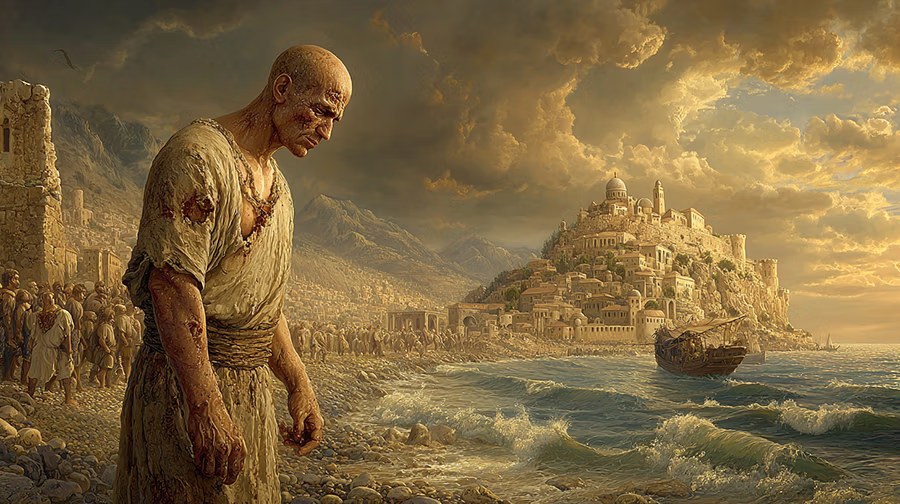
When Jonah emerged on dry land, he was alive but profoundly changed. The Book of Jonah 2 doesn’t provide physical descriptions, but understanding basic biology allows us to reconstruct what likely occurred during those three days inside a bottom-feeding fish.
First, Jonah would have had teeth marks on his body from being swallowed. Depending on the size and type of fish, these could have been substantial lacerations or crushing injuries that somehow healed during the resurrection process. These marks would serve as permanent evidence of what had happened to him.
Second, the digestive juices of a large fish, particularly one that feeds on deceased creatures from the ocean floor, would be extremely acidic. Three days of exposure to these enzymes would have stripped away Jonah’s hair completely. Not just his head but his entire body would have been rendered hairless by the chemical process.
Third, the acid would have affected different parts of Jonah’s skin to varying degrees. Areas covered by hair would have had some initial protection before the hair dissolved. Areas directly exposed to digestive juices would have suffered more damage. Parts of his body might have been pressed against the relatively safer stomach lining. The result would have been a patchwork appearance, with some skin appearing bleached from seawater, other areas reddened or discolored from acid exposure, and still others showing different textures and hues.
Fourth, three days submerged in seawater would have created its own effects, with certain parts of his skin taking on the distinctive pallor of extended water exposure. Combined with the digestive acid effects, Jonah would have presented an appearance unlike any normal human being, resembling a multi-colored patchwork more than a recognizable person.
The Divine Purpose Behind Jonah’s Appearance
This dramatic transformation was not accidental or merely unfortunate. It was part of God’s intentional design for Jonah’s ministry to Nineveh. When this grotesquely altered prophet walked into a city of 600,000 people and delivered a simple one-sentence message about impending judgment, his appearance provided unmistakable evidence that something supernatural had occurred.
The Assyrians, like most ancient cultures, had myths and stories about sea creatures and the underworld. They would have heard versions of stories about people being swallowed by great fish. But most would have dismissed such tales as mythology, similar to how contemporary audiences often view the Book of Jonah 2. When a man appeared who looked exactly like someone who had been digested by a fish but somehow survived, the story could no longer be dismissed as mere mythology.
Jonah’s appearance authenticated his message in a way that normal prophetic credentials could not have achieved. From the poorest beggar to the king himself, everyone who saw Jonah would recognize that something impossible had occurred. This visual evidence, combined with his prophetic proclamation, created the conditions for the mass conversion that would follow in subsequent chapters.
This detail reminds modern readers that God’s ways often involve elements we would not design ourselves. We might prefer that God’s messengers look impressive, polished, and professionally credible according to worldly standards. God sometimes chooses to work through people who bear the visible marks of their own failures, struggles, and divine interventions. The Book of Jonah 2 teaches that God’s power is often most evident when working through vessels that clearly could not accomplish anything through their own strength or appearance.
Jonah as a Prophetic Sign to Israel and the Nations
How does the Book of Jonah 2 point to Jesus Christ? The Book of Jonah 2 foreshadows Jesus Christ through Jonah’s three days in the fish paralleling Christ’s three days in the tomb, both experiencing death and resurrection by God’s power. Jesus explicitly identified Himself with the sign of Jonah, declaring that just as Jonah was in the fish’s belly, the Son of Man would be in the earth’s heart, making this the primary Old Testament type of Christ’s death and resurrection.
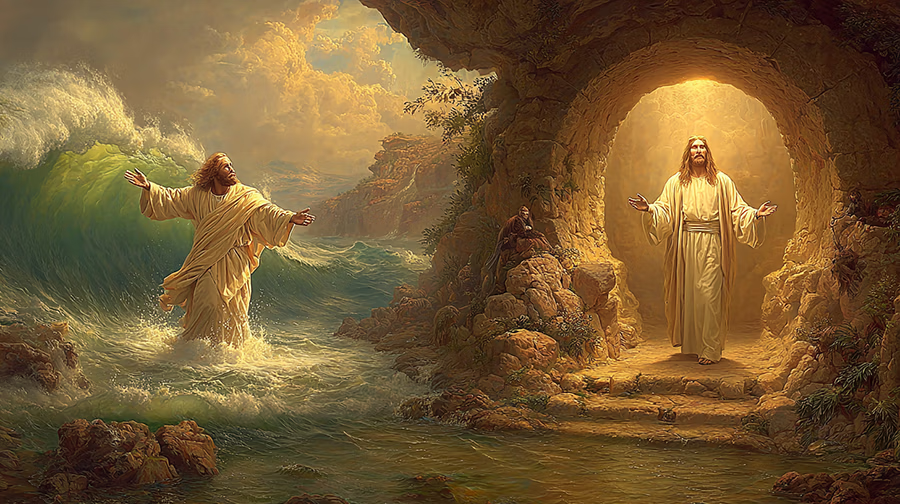
Beyond the immediate narrative of a prophet’s rebellion and restoration, the Book of Jonah 2 functions as a complex prophetic sign operating on multiple levels simultaneously. Understanding these layers reveals why this seemingly simple story carries such theological weight throughout Scripture.
The Sign to Israel’s Corporate Identity
God was using Jonah to send Israel a message about their own spiritual condition. The nation had received tremendous privileges: the law, the prophets, the temple, the covenant promises. They understood themselves as God’s chosen people with exclusive access to His truth and favor. Yet like Jonah, they had become hardened to God’s broader purposes, believing His mercy should extend only to them and not to Gentile nations.
Jonah’s racism toward the Assyrians mirrored Israel’s ethnic and religious pride. His willingness to die rather than see God show mercy to foreigners reflected Israel’s misunderstanding of their calling. God had always intended for Israel to be a light to the nations, a kingdom of priests who would make God known to all peoples. Instead, they had become insular and exclusive, treating their special relationship with God as an end in itself rather than a means to bless the world.
The Book of Jonah 2 demonstrates what happens when God’s people refuse their calling: they end up in death, at the gates of hell, facing the loss of everything they claim to value. Only when brought to this extremity do they finally cry out in genuine repentance. God was warning Israel that their trajectory of disobedience would lead them to national death and exile, from which only divine mercy could restore them.
This warning proved prophetic. Within a few generations, Israel would face Assyrian invasion and the northern kingdom would be scattered, never to return as a unified entity. Later, Judah would experience Babylonian exile, a corporate death and resurrection that paralleled Jonah’s individual experience. The Book of Jonah 2 served as an advance warning that Israel largely ignored, much like Jonah initially ignored God’s call.
The Sign Pointing to Christ’s Death and Resurrection
The most significant prophetic function of the Book of Jonah 2 is its anticipation of Jesus Christ. When the Pharisees demanded a sign from Jesus, He responded that no sign would be given except the sign of the prophet Jonah. He explained that just as Jonah was three days and three nights in the great fish’s belly, so the Son of Man would be three days and three nights in the heart of the earth.
This parallel is not coincidental or merely illustrative. It represents God’s deliberate design across centuries, embedding in Jonah’s historical experience a pattern that would later be fulfilled in Christ. The three-day timeline matches precisely. The experience of actual death followed by supernatural resurrection matches. Even the purpose of the experience connects: both Jonah and Jesus were delivered through death to bring a message of repentance to those outside God’s covenant people.
The Book of Jonah 2 thus becomes one of the clearest Old Testament types of Christ’s atonement. A type in biblical interpretation is a historical person, event, or institution that God designed to foreshadow something greater in Christ. Jonah was a real prophet who really died and was really resurrected. This historical reality simultaneously pointed forward to the real death and real resurrection of the Messiah, as we explore throughout our teaching on how God’s providence works through historical events to accomplish His purposes.
The differences between Jonah and Jesus are as significant as the similarities. Jonah died because of his own sin and rebellion. Jesus died bearing the sins of others while remaining personally sinless. Jonah needed God’s mercy for himself. Jesus extended God’s mercy to humanity. Jonah reluctantly went to Nineveh after his resurrection. Jesus willingly endured the cross for the joy set before Him. Yet these differences only highlight the greater reality to which Jonah pointed: the perfect prophet who would fully obey God’s will and accomplish complete salvation.
The Universal Message About God’s Sovereignty
The Book of Jonah 2 also teaches fundamental truths about God’s character that transcend cultural and temporal boundaries. God’s sovereignty extends over nature, commanding storms and fish. His authority reaches into death itself, hearing prayers from Sheol. His mercy extends beyond what seems reasonable or fair, saving a rebellious prophet who deserved judgment.
These truths directly address questions every generation faces: Is God truly in control? Can He be trusted? Does He care about individuals? Will He forgive genuine repentance even after serious rebellion? The Book of Jonah 2 answers these questions through historical narrative rather than abstract theology, providing concrete evidence of God’s character in action.
For contemporary readers living in an age of skepticism and doubt, the Book of Jonah 2 offers something apologetics alone cannot provide: a test case of God’s power and mercy operating in verifiable history. Jonah was not a mythological character but a real prophet whose ministry left historical traces. Nineveh was not a fictional city but the capital of a well-documented empire. The events described had real consequences that rippled through subsequent history.
Applying Jonah’s Prayer to Contemporary Christian Life
What can modern Christians learn from the Book of Jonah 2? Modern Christians learn from the Book of Jonah 2 that God pursues His rebellious servants with relentless love, that genuine repentance is possible even at the brink of spiritual death, that God hears prayers from any circumstance, that we must identify and abandon worthless idols, and that salvation belongs entirely to the Lord, not to human effort or worthiness.
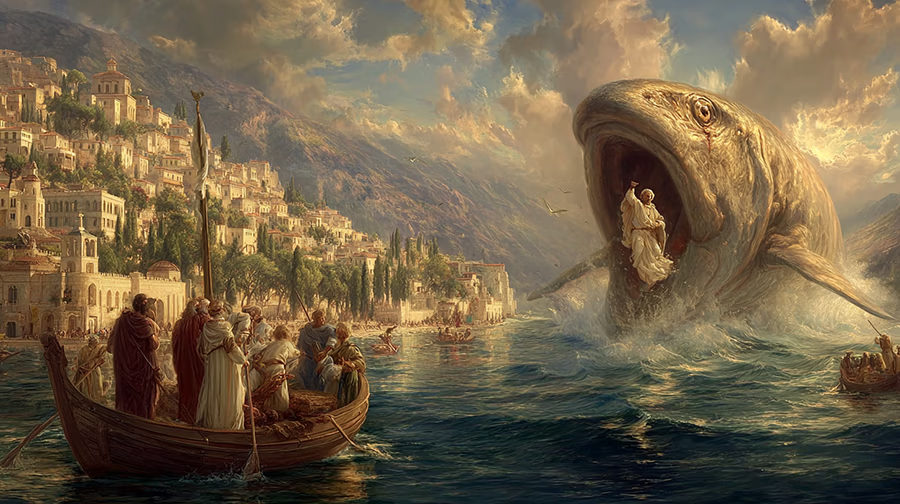
The historical and prophetic dimensions of the Book of Jonah 2 should not obscure its immediate practical application to believers today. This text speaks directly to several common struggles in contemporary Christian experience, offering both warning and encouragement to those who will hear.
When God’s Call Conflicts with Personal Preferences
Many believers experience what Jonah faced: a clear sense of God’s direction that conflicts sharply with personal desires, prejudices, or comfort. This might involve a career change that requires financial sacrifice, a calling to ministry in an unexpected location, a command to reconcile with someone who has caused hurt, or an instruction to share the gospel with people the believer finds difficult or unpleasant.
The Book of Jonah 2 demonstrates that running from such calls does not lead to peace or happiness. Jonah tried to escape God’s assignment and ended up in progressively worse situations: paying his own way to flee, caught in a deadly storm, thrown overboard by desperate sailors, drowning in the sea, and finally dead inside a fish at the gates of hell. Each step away from obedience brought greater misery, not the relief he sought.
Contemporary believers should recognize this pattern in their own lives. When we sense God’s leading but resist because it seems unreasonable, uncomfortable, or contrary to our plans, we often find ourselves in increasingly troubled circumstances. These difficulties are not random bad luck but God’s loving discipline designed to bring us back to the path of obedience. The Book of Jonah 2 encourages us to respond to God’s initial gentle calls rather than requiring Him to pursue us to the point of crisis.
The Reality of Hardened Hearts
Jonah was a hardened case, requiring extreme measures before he genuinely cried out to God. The Book of Jonah 2 honestly acknowledges that this describes many believers, including entire nations and cultures. We develop layers of resistance to God’s work through repeated small choices to prioritize our will over His, building up calloused areas where His voice can no longer easily penetrate.
This hardening process often involves good things pursued in wrong ways or proper order. Jonah’s theological conviction that God was merciful was correct. His belief that God would forgive repentant sinners was accurate. His error was deciding that these truths should not apply to certain people he had decided were beyond God’s grace. He took correct theology and twisted it through the lens of his own prejudice until it became a reason to disobey direct divine instruction.
Modern believers fall into similar patterns. We might have correct biblical knowledge about generosity but harden our hearts against actually giving sacrificially. We might affirm theologically that all people are made in God’s image but harbor practical racism or classism. We might confess that God is sovereign but live in constant anxiety and control-seeking. The Book of Jonah 2 warns that such hardening can progress to dangerous points where only severe divine intervention can break through.
At the same time, the text offers hope. Even a hardened heart can be softened when brought to the end of itself. Even a stubborn prophet can pray genuinely when facing the gates of hell. Even long-standing rebellion can be overcome by God’s persistent love. The key is recognizing our condition honestly rather than maintaining the pretense that we are fine when we are actually running from God, which connects to the broader theme of honest self-examination we explore in our Five Smooth Stones series about spiritual warfare and truth.
Praying from Desperate Circumstances
One of the most encouraging aspects of the Book of Jonah 2 is the reminder that God hears prayers from any situation. Jonah prayed from inside a fish, from the realm of death, from a place where no human help could reach. Yet his prayer ascended to God’s holy temple and received an answer.
This truth speaks powerfully to believers facing circumstances that feel hopeless. Whether trapped in addiction, overwhelmed by mental health struggles, caught in abusive relationships, facing terminal illness, or enduring any other form of desperate suffering, the Book of Jonah 2 testifies that God’s hearing is not limited by our circumstances. He can hear from the depths of the sea, from the belly of Sheol, from wherever we find ourselves.
The text also reminds us that prayer from desperate circumstances need not be eloquent or theologically sophisticated. Jonah’s prayer was honest, direct, and focused on fundamental truths: God is sovereign, God is merciful, God can save, salvation belongs to the Lord. When we find ourselves in extremity, we need not worry about crafting perfect prayers. We simply need to cry out to the One who hears.
Identifying Our Worthless Idols
Jonah’s warning about worthless idols challenges contemporary believers to examine what we actually prioritize in practice rather than what we claim to value in theory. The Book of Jonah 2 forces the question: What would we be unwilling to sacrifice if God asked us to give it up?
For some, the worthless idol might be financial security, leading to compromised ethics in business or unwillingness to give generously. For others, it might be reputation and social standing, preventing honest acknowledgment of sin or unpopular stands for truth. It could be family comfort, making God’s call to service seem impossible because it would disrupt children’s schooling or require moving away from extended family. It might be political ideology, where partisan loyalty supersedes biblical principles.
The test of whether something has become a worthless idol is simple: Does it prevent us from fully obeying God? Are we willing to forsake mercy for the sake of keeping it? Would we rather die than lose it? Jonah preferred death to seeing God show mercy to Assyrians. What would we prefer death to losing?
The Book of Jonah 2 does not condemn having possessions, enjoying hobbies, loving family, or pursuing excellence in work. It condemns allowing any of these good things to displace God as the supreme priority and ultimate treasure. When anything else fills the role that only God should occupy, it becomes a worthless idol that forfeits our own mercy.
The Necessity of Public Testimony
Jonah committed to sacrifice with the voice of thanksgiving, promising public acknowledgment of God’s deliverance. The Book of Jonah 2 itself represents the fulfillment of this vow, as Jonah documented his rebellion and restoration for future generations to read.
Contemporary believers often keep their faith private, rarely speaking about God’s work in their lives. We might pray privately, read Scripture individually, and maintain personal spiritual disciplines while avoiding public testimony about what God has done. The Book of Jonah 2 challenges this tendency, reminding us that genuine thanksgiving expresses itself vocally and publicly.
This does not mean constant religious broadcasting or intrusive evangelism. It means being willing to acknowledge God’s role in our lives when appropriate opportunities arise. It means testifying to His faithfulness when others face similar struggles to what we have overcome. It means being known as people who follow Jesus rather than hiding our faith to avoid potential awkwardness or opposition, a principle central to our mission of applying biblical truth to contemporary concerns as outlined in our Mission statement.
The Benjamin Franklin Prayer: Authentic Faith in America’s Founding
The teaching on the Book of Jonah 2 concludes with a prayer compiled from Benjamin Franklin’s writings, challenging the common claim that America’s founders were deists who believed in an absent, uninvolved God. This connection between Jonah’s story and American history illustrates how the Book of Jonah 2 continues speaking to contemporary issues beyond merely personal spirituality.
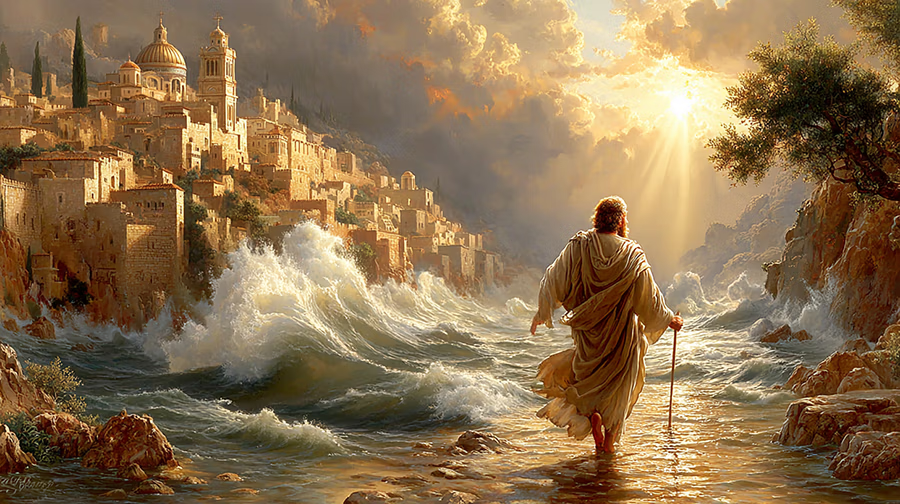
Franklin’s prayer, drawn from his letters to people he cared about, demonstrates authentic Christian faith:
Let us live then under the continual impression that men ought always to pray and not faint, that it is the Divine will that men pray everywhere, that we should pray without ceasing, rejoicing evermore, and in everything give thanks. The effectual fervent prayer of a righteous man availeth much. Come then in childlike confidence to our blessed and glorious Father, not as a formality nor merely as a duty, but because you need His Almighty arm to protect and sustain you, to guard and shield you in the midst of the evils of the world, and finally to save you.
This prayer echoes themes directly from the Book of Jonah 2: prayer from any circumstance, dependence on God’s power rather than human ability, thanksgiving for deliverance, and recognition that salvation belongs to the Lord. Franklin understood, like Jonah learned, that genuine faith requires acknowledging complete dependence on God’s mercy.
The prayer continues with profound trust in divine providence:
Our glorious Father can see dangers that we cannot see and avert calamities that we have no power to stay. He is our everlasting trust, our stronghold, the rock of our defense. In the name then of the Lord Jesus the Christ, our only Savior, let us come to our Father who always hears us and who is faithful to keep that which is committed to His hands, who will be with us in every trial, in all our sufferings, and in crossing the cold river, where He will receive us to Himself to be with Him forever and ever.
These words, written by one of America’s founding fathers, demonstrate that the nation was established by people who understood the principles taught in the Book of Jonah 2: God’s sovereignty extends over all circumstances, His mercy is available to those who call upon Him, and salvation comes only through Jesus Christ. The historical revisionism that portrays the founders as secular deists ignores substantial documentary evidence of genuine Christian faith, much like modern skepticism that treats the Book of Jonah 2 as mythology ignores its historical authenticity.
The connection between Jonah’s story and American founding principles is more than coincidental. A nation built on the recognition that rights come from the Creator rather than human government, that moral law transcends human preference, and that ultimate accountability extends beyond earthly authority inherently requires a believing populace. As trust in God erodes and worthless idols replace Him in national consciousness, the constitutional framework loses the foundation that makes it sustainable.
Conclusion: From Death to Deliverance Through Divine Mercy
The Book of Jonah 2 presents one of Scripture’s most dramatic demonstrations of God’s pursuing love and sovereign power. Through ten lines of prayer from the depths of death, we witness the transformation of a rebellious prophet into a humbled servant, the reversal of seemingly final judgment into miraculous deliverance, and the foreshadowing of humanity’s ultimate salvation through Christ’s death and resurrection.
This chapter challenges several comfortable assumptions that contemporary believers often hold. It insists on the historical authenticity of miraculous intervention. It demonstrates that God sometimes allows His servants to reach the gates of hell before delivering them. It warns that worthless idols can cost us eternal mercy. It reveals that even dramatic previous relationships with God do not prevent serious rebellion. It teaches that salvation belongs entirely to the Lord, with no room for human contribution or merit.
Yet the Book of Jonah 2 simultaneously offers profound encouragement. God pursues His servants with relentless patience. Prayer reaches Him from any circumstance, no matter how desperate. Genuine repentance finds mercy even at the last moment. God’s purposes cannot be permanently thwarted by human rebellion. Divine deliverance often comes in ways more wonderful than we could design ourselves.
For believers today facing various forms of resistance to God’s call, the Book of Jonah 2 provides both warning and hope. The warning: running from God leads progressively deeper into trouble, potentially to the point of spiritual death. The hope: even from that place of extremity, crying out to God brings deliverance. Even the hardest case can be broken and restored by divine love.
The chapter also invites honest self-examination about our own worthless idols. What are we prioritizing above full obedience to God? Where have our hearts become hardened to His voice? What prejudices or preferences blind us to His broader purposes? The Book of Jonah 2 suggests that facing these questions honestly now is far better than waiting until God must take us to extremity to get our attention.
Finally, this text calls us to live in light of its central declaration: salvation is of the Lord. This means abandoning confidence in our own righteousness, ability, or religious performance. It means recognizing our complete dependence on divine mercy. It means approaching God in childlike faith rather than sophisticated self-sufficiency. It means testifying publicly to what God has done rather than taking credit ourselves. And ultimately, it means trusting that the same God who delivered Jonah from death has delivered us through Christ’s resurrection, securing eternal salvation for all who call upon His name.
Further Reading and Resources
1. Blue Letter Bible – Jonah 2 Study Guide by David Guzik Detailed verse-by-verse commentary on Jonah 2 with practical applications and theological insights from this respected Bible teacher.
2. Got Questions – Was Jonah Really Swallowed by a Whale? Addresses the historical authenticity and scientific plausibility of Jonah’s account, examining biblical and archaeological evidence.
3. Answers in Genesis – Jonah and the Great Fish Explores the miracle of Jonah from a creation science perspective, discussing which sea creatures could have swallowed a human whole.
4. Desiring God – Cry of Distress and Voice of Thanks by John Piper John Piper’s sermon on Jonah 2 examining the prophet’s prayer from the fish’s belly and its theological significance.
5. Christian Research Institute – Has Science Swallowed the Myth of Jonah’s Whale? Scholarly article examining scientific evidence and Jesus’ own affirmation of Jonah’s historicity as foreshadowing His resurrection.
Frequently Asked Questions (FAQs)
Was Jonah Really Swallowed by a Fish for Three Days?
Yes, the Book of Jonah 2 records a historical event, not a parable or allegory. The text indicates Jonah drowned and died, his body was preserved in a great fish for three days, and God miraculously resurrected him. Jesus Himself affirmed this account’s historicity when He referenced it as a sign of His own death and resurrection (Matthew 12:39-40), making the literal reality of Jonah’s experience essential to Christian theology.
What Does Sheol Mean in the Book of Jonah 2?
Sheol in the Book of Jonah 2 refers to the Hebrew understanding of the realm of the dead, where souls go after physical death. When Jonah prayed “out of the belly of Sheol,” he was at the threshold of this realm, having died physically but not yet passed the final point of no return. This demonstrates that God’s power to hear and save extends even into the realm of death itself.
How Does Jonah’s Experience Point to Jesus Christ?
The Book of Jonah 2 foreshadows Christ through the three-day timeline of death and resurrection, the deliverance of a message of repentance to those outside God’s covenant people, and the demonstration that salvation belongs entirely to God rather than human merit. Jesus explicitly identified Himself with the sign of Jonah (Matthew 12:40), making this one of the clearest Old Testament types of His atoning work.
What Are the Worthless Idols Jonah Warns About?
The worthless idols mentioned in the Book of Jonah 2 include anything we prioritize above our relationship with God and eternal salvation. For contemporary believers, these might include career success, physical appearance, entertainment, wealth, comfort, political ideology, or even family when these supersede obedience to God. The warning is that such idols cause us to “forsake our own mercy,” losing eternal benefits for temporary pleasures.

